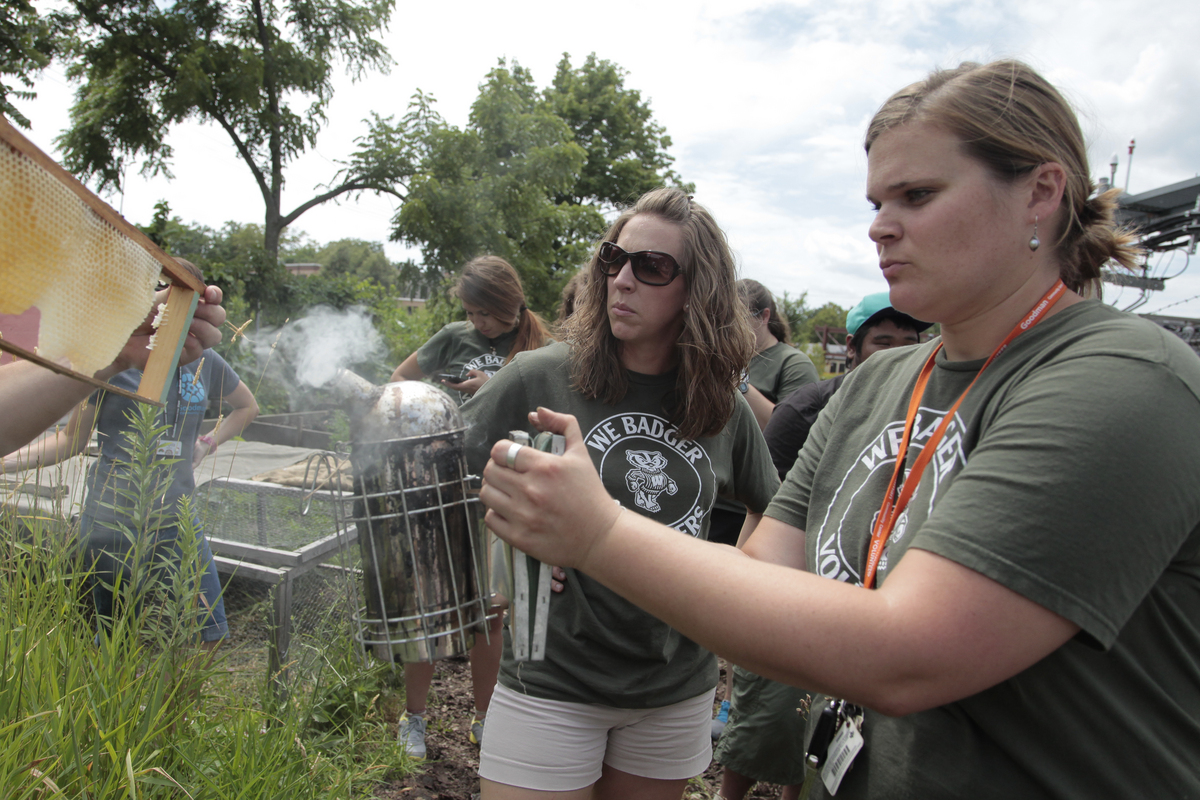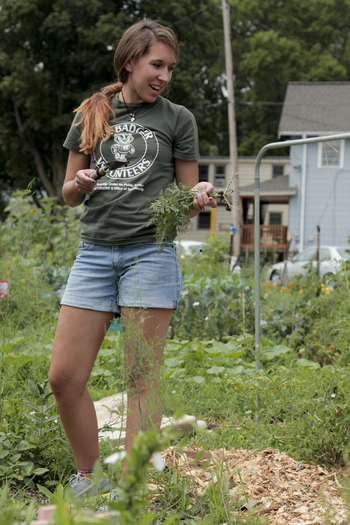WE Badger Volunteers focus on sustainability in the community

Lindsey Kaiser (center), graduate student in educational leadership and policy analysis and 2nd grade teacher in the Lake Mills Area School District, and Kara Lawson (right), graduate student in curriculum and instruction and 3rd grade teacher at Lincoln Elementary School in Madison, learn to use a smoker during a beekeeping lesson at the Goodman Community Center
Photos: Kait Vosswinkel
Fiona Baus came to UW–Madison to study nursing, but her educational experience has taken her to a different kind of classroom.
Becoming a member of WE Badger Volunteers, an extension of the Badger Volunteers Program focused on sustainability and environmental stewardship, lets Baus learn about sustainable agricultural techniques.
“I’ve always been interested in sustainability … and I wanted to get involved because I had extra time,” says Baus. “Even though I’m [studying] nursing, I’m learning a lot of stuff [here] that will help me too. Even just learning about organic farming, I think that’s beneficial for almost anyone.”
Now in its second semester, WE Badger Volunteers — a joint venture between UW–Madison’s WE Conserve and the Office of Sustainability — adds a green aspect to the existing Badger Volunteers model. Teams of students commit to volunteer with a community partner on a weekly basis for an entire semester.

Erika Nickels, an undergraduate in community and environmental sociology and environmental studies, weeding invasive species from a garden at Goodman Community Center.
Last October, program coordinator Karen Crossley was hired by the Morgridge Center for Public Service to develop and adapt the existing Badger Volunteers model toward this new focus. Based on the findings published by the Campus Sustainability Initiative Taskforce in 2010, Crossley was able to identify target themes for the volunteer program, including urban agriculture, transportation and energy.
“We tried to define what we meant by sustainability and environmental stewardship and really built our definition upon the work that this campus has been doing over the past several years,” says Crossley.
In addition to completing 30 hours of service, volunteers participate in education sessions and reflection activities to strengthen the impact of the program. They are encouraged to make connections between their volunteer work, education and professional goals.
Among the more tangible reasons Crossley sees from students wanting to participate in WE Badger Volunteers are a commitment to being a global citizen and interest in living a sustainable life.
“That to me is that sort of, ‘I want to change the world, I want to make a difference in the world,’ and that’s really powerful,” she says.
As a team leader at Troy Community Gardens and Farm on Madison’s north side, Baus and her five-person team help with weeding, pruning and harvesting crops for Community Supported Agriculture shares. Under the CSA model, members buy shares at the beginning of the growing season and receive a weekly portion of whatever the farm produces.
“It’s not always the professors or the research, but the students … who can use those experiences to help them grow in the future when they are professionals and have this experience of service and being out in the community.”
Kristen Cassarini
For the spring pilot, the program had secured 12 volunteer sites; this summer, that number has grown to 20.
At the Goodman Community Center, another WE Badger Volunteersite, a few brave students got in on the action during a Seed to Table beekeeping lesson.
Seed to Table is an alternative high school credit program dedicated to teaching kids about urban agriculture, cooking and gardening.
Program assistant Kristen Cassarini worked closely with Crossley during the development process and became interested in becoming a WE Badger Volunteer herself.
“I missed being in a school and working with students,” says Cassarini, a graduate student in educational leadership and policy analysis. “There are such varied options to choose from, so I was excited to find something where I could work with kids.”
In addition to students and community partners, there has been strong interest in the WE Badger Volunteers program by faculty and staff.
Greenhouse Residential Learning Community and the Nelson Institute’s new sustainability certificate may offer the program as another pathway for fulfilling student engagement.
Crossley hopes that as awareness of WE Badger Volunteers grows, it will continue to expand.
“The ultimate idea would be to have 500 or 600 students serving a semester and our belief is that there is that level of interest on campus and that level of interest in the community,” she says. “We’re not going to get there in round one or round two, so we’re trying to balance that as we go along.”
WE Badger Volunteers has been well received by both the campus and community. Crossley’s hope is that students, faculty and staff will learn about people, organizations and issues in the community while community members will become aware of the resources, research, knowledge and “direct horsepower” that exists on campus.
“When you aggregate all of the teams and the volunteer commitments made in the semester, it’s a lot of hours just in terms of human capital out there working to advance the work and missions of the organizations,” Crossley says.
Cassarini says the WE Badger Volunteers model is what the Wisconsin Idea is all about.
“Some of our greatest resources are our students,” she says. “It’s not always the professors or the research, but the students … who can use those experiences to help them grow in the future when they are professionals and have this experience of service and being out in the community.”
—Jane Roberts
Tags: student life, sustainability




